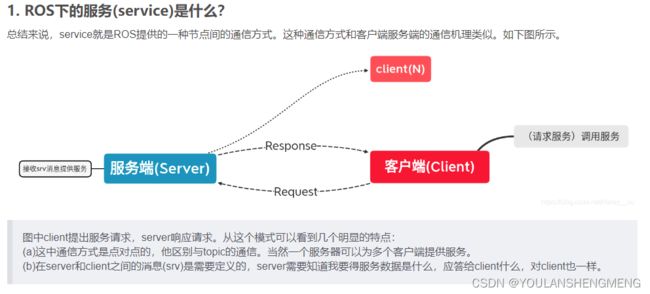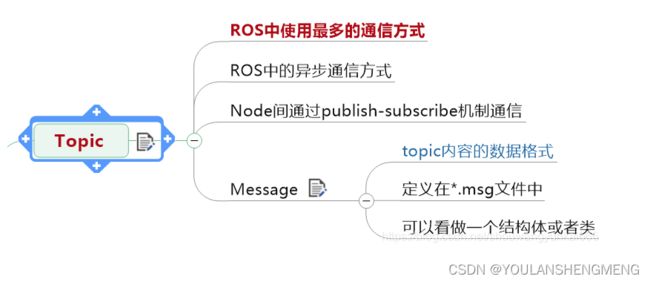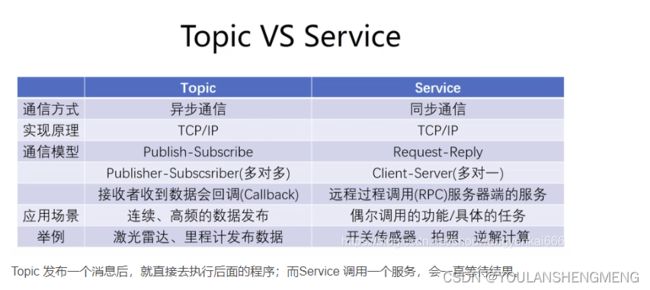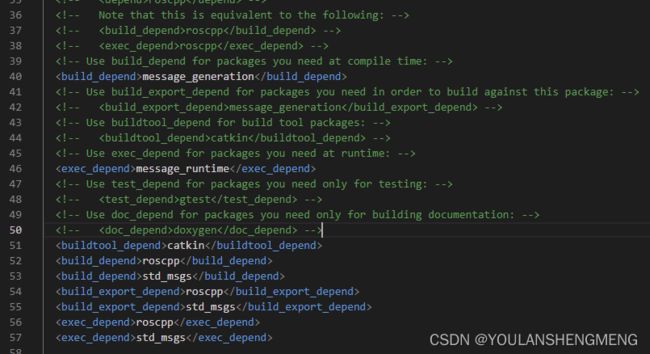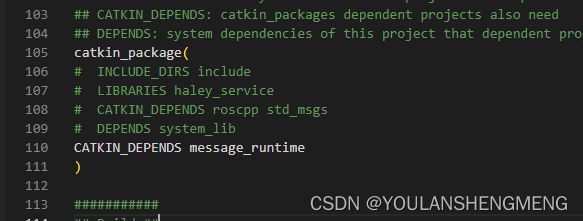ROS下写服务
话题和服务的对比:
1.话题
话题是单向的,而且不需要等待服务端上线,直接发就行,数据的实时性比较高。
频率高,实时性强的传感器数据的传递一般使用话题实现。
话题通信是ROS中使用频率最高的一种通信模式,话题通信是基于发布订阅模式的,也即:一个节点发布消息,另一个节点订阅该消息。话题通信的应用场景也极其广泛。
用于不断更新的、少逻辑处理的数据传输场景。
2.服务
服务是双向的,客户端发送请求后,服务端有响应,可以得知服务端的处理结果。
频率较低,强调服务特性和反馈的场景一般使用服务实现。
服务通信也是ROS中一种极其常用的通信模式,服务通信是基于请求响应模式的,是一种应答机制。也即: 一个节点A向另一个节点B发送请求,B接收处理请求并产生响应结果返回给A。比如如下场景:
机器人巡逻过程中,控制系统分析传感器数据发现可疑物体或人... 此时需要拍摄照片并留存。
在上述场景中,就使用到了服务通信。
一个节点需要向相机节点发送拍照请求,相机节点处理请求,并返回处理结果
与上述应用类似的,服务通信更适用于对时时性有要求、具有一定逻辑处理的应用场景。
2,编写简单的服务
参考链接: [ROS学习]ROS服务浅析及简单实现(C++)_c++ ros 服务_Haley__xu的博客-CSDN博客
如果没有工作空间,可以先创建一个工作空间,创建工作空间的步骤为:
mkdir -p haley_ws/src
cd haley_ws/src/
catkin_init_workspace
在该工作空间下创建功能包,包名命名为: haley_service
catkin_create_pkg haley_service roscpp std_msgs
2.1 创建服务的消息
创建所需的自定义服务消息(srv),这里我们定义一个求和的srv,在sum.srv中写入消息的格式。
mkdir srv
cd srv
touch sum.srv
sum.srv的内容如下,这里的上半部分是请求数据格式,下半部分是应答的数据格式。中间必须用三个短线隔开。
int32 A
int32 B---
int32 SUM
现在来查看一下我们的srv消息吧
(a)编译工作空间
(b)查看srv格式
catkin_make
source ./devel/setup.bash
rossrv show haley_service/sum
消息格式的显示的结果如下图所示:
2.2 编写服务
在haley_service功能包下的src中建立service.cpp,并写入如下内容:
#include "ros/ros.h"
#include "haley_service/sum.h"
/**
* 服务器的回调函数
* 输入参数:服务所需的请求消息,这里是定义好的sum.srv中的Request数据形式
* 对服务请求数据进行求和操作,返回Response数据
**/
bool add(haley_service::sum::Request& req, haley_service::sum::Response& res)
{
res.SUM = req.A + req.B;
ROS_INFO("Response the request: %d + %d = %d", req.A ,req.B, res.SUM);
return true;
}
/**
* 主函数
**/
int main(int argc, char** argv)
{
//初始化节点,节点名为sum_service_node
ros::init(argc, argv, "sum_service_node");
//初始化句柄
ros::NodeHandle n;
//建立一个服务实例,服务端的名称为:sum_server。使用服务函数为add
ros::ServiceServer service = n.advertiseService("sum_server", add);
//判断服务是否建立成功
if (service)
{
ROS_INFO("Server has been ready...");
ros::spin();
}
else
{
ROS_ERROR("Server not ready !");
return 1;
}
return 0;
}
2.3 对Cmake和package.xml做处理
我们发现在haley_service的软件包下的CMakeLists.txt有这样一段话(大概在24-46行)
################################################
## Declare ROS messages, services and actions ##
################################################
## To declare and build messages, services or actions from within this
## package, follow these steps:
## * Let MSG_DEP_SET be the set of packages whose message types you use in
## your messages/services/actions (e.g. std_msgs, actionlib_msgs, ...).
## * In the file package.xml:
## * add a build_depend tag for "message_generation"
## * add a build_depend and a exec_depend tag for each package in MSG_DEP_SET
## * If MSG_DEP_SET isn't empty the following dependency has been pulled in
## but can be declared for certainty nonetheless:
## * add a exec_depend tag for "message_runtime"
## * In this file (CMakeLists.txt):
## * add "message_generation" and every package in MSG_DEP_SET to
## find_package(catkin REQUIRED COMPONENTS ...)
## * add "message_runtime" and every package in MSG_DEP_SET to
## catkin_package(CATKIN_DEPENDS ...)
## * uncomment the add_*_files sections below as needed
## and list every .msg/.srv/.action file to be processed
## * uncomment the generate_messages entry below
## * add every package in MSG_DEP_SET to generate_messages(DEPENDENCIES ...)
说的还是比较明白的,这里说说自己的理解:
要声明和建立像messages、services和actions按照下面的步骤操作就行:
(1) 在package.xml里做如下的操作
添加message_generation的依赖标记
添加message_runtime的标记
(2)在CMakeLists.txt的处理
在 find_package(…)添加message_generation和每个使用的消息包集
在 catkin_package(CATKIN_DEPENDS…)添加message_runtime和每个使用的消息包集
取消需要的add_*_files的注释
在generate_messages(…)中添加使用的消息包集依照上面的说法,修改对应的文件
2.3.1 在package.xml中打开注释
message_generation
message_runtime
在第40和46行:
2.3.2 在CMakeLists.txt下做处理
在find_package添加message_generation
find_package(catkin REQUIRED COMPONENTS
roscpp
std_msgs
message_generation
)
在 catkin_package(CATKIN_DEPENDS…)添加message_runtime
catkin_package(
# INCLUDE_DIRS include
# LIBRARIES haley_service
# CATKIN_DEPENDS roscpp std_msgs
# DEPENDS system_lib
CATKIN_DEPENDS message_runtime
)
取消需要的add_*_files的注释,将服务的消息添加进去:
add_service_files(
FILES
sum.srv
)
在generate_messages(…)中添加使用的消息包集,(这一步很重要,不然无法生成相应的头文件)
generate_messages(
DEPENDENCIES
std_msgs
)
搞定了消息的处理,现在将service.cpp也加入编译。 在CMakeLists.txt添加如下的内容
add_executable(${PROJECT_NAME}_node src/service.cpp)
target_link_libraries(${PROJECT_NAME}_node
${catkin_LIBRARIES}
)
最终CMakeLists.txt的内容如下:
cmake_minimum_required(VERSION 3.0.2)
project(haley_service)
## Compile as C++11, supported in ROS Kinetic and newer
# add_compile_options(-std=c++11)
## Find catkin macros and libraries
## if COMPONENTS list like find_package(catkin REQUIRED COMPONENTS xyz)
## is used, also find other catkin packages
find_package(catkin REQUIRED COMPONENTS
roscpp
std_msgs
message_generation
)
## System dependencies are found with CMake's conventions
# find_package(Boost REQUIRED COMPONENTS system)
## Uncomment this if the package has a setup.py. This macro ensures
## modules and global scripts declared therein get installed
## See http://ros.org/doc/api/catkin/html/user_guide/setup_dot_py.html
# catkin_python_setup()
################################################
## Declare ROS messages, services and actions ##
################################################
## To declare and build messages, services or actions from within this
## package, follow these steps:
## * Let MSG_DEP_SET be the set of packages whose message types you use in
## your messages/services/actions (e.g. std_msgs, actionlib_msgs, ...).
## * In the file package.xml:
## * add a build_depend tag for "message_generation"
## * add a build_depend and a exec_depend tag for each package in MSG_DEP_SET
## * If MSG_DEP_SET isn't empty the following dependency has been pulled in
## but can be declared for certainty nonetheless:
## * add a exec_depend tag for "message_runtime"
## * In this file (CMakeLists.txt):
## * add "message_generation" and every package in MSG_DEP_SET to
## find_package(catkin REQUIRED COMPONENTS ...)
## * add "message_runtime" and every package in MSG_DEP_SET to
## catkin_package(CATKIN_DEPENDS ...)
## * uncomment the add_*_files sections below as needed
## and list every .msg/.srv/.action file to be processed
## * uncomment the generate_messages entry below
## * add every package in MSG_DEP_SET to generate_messages(DEPENDENCIES ...)
## Generate messages in the 'msg' folder
# add_message_files(
# FILES
# Message1.msg
# Message2.msg
# )
## Generate services in the 'srv' folder
add_service_files(
FILES
sum.srv
)
## Generate actions in the 'action' folder
# add_action_files(
# FILES
# Action1.action
# Action2.action
# )
## Generate added messages and services with any dependencies listed here
generate_messages(
DEPENDENCIES
std_msgs
)
################################################
## Declare ROS dynamic reconfigure parameters ##
################################################
## To declare and build dynamic reconfigure parameters within this
## package, follow these steps:
## * In the file package.xml:
## * add a build_depend and a exec_depend tag for "dynamic_reconfigure"
## * In this file (CMakeLists.txt):
## * add "dynamic_reconfigure" to
## find_package(catkin REQUIRED COMPONENTS ...)
## * uncomment the "generate_dynamic_reconfigure_options" section below
## and list every .cfg file to be processed
## Generate dynamic reconfigure parameters in the 'cfg' folder
# generate_dynamic_reconfigure_options(
# cfg/DynReconf1.cfg
# cfg/DynReconf2.cfg
# )
###################################
## catkin specific configuration ##
###################################
## The catkin_package macro generates cmake config files for your package
## Declare things to be passed to dependent projects
## INCLUDE_DIRS: uncomment this if your package contains header files
## LIBRARIES: libraries you create in this project that dependent projects also need
## CATKIN_DEPENDS: catkin_packages dependent projects also need
## DEPENDS: system dependencies of this project that dependent projects also need
catkin_package(
# INCLUDE_DIRS include
# LIBRARIES haley_service
# CATKIN_DEPENDS roscpp std_msgs
# DEPENDS system_lib
CATKIN_DEPENDS message_runtime
)
###########
## Build ##
###########
## Specify additional locations of header files
## Your package locations should be listed before other locations
include_directories(
# include
${catkin_INCLUDE_DIRS}
)
add_executable(haley_service_node src/service.cpp)
target_link_libraries(haley_service_node
${catkin_LIBRARIES}
)
## Declare a C++ library
# add_library(${PROJECT_NAME}
# src/${PROJECT_NAME}/haley_service.cpp
# )
## Add cmake target dependencies of the library
## as an example, code may need to be generated before libraries
## either from message generation or dynamic reconfigure
# add_dependencies(${PROJECT_NAME} ${${PROJECT_NAME}_EXPORTED_TARGETS} ${catkin_EXPORTED_TARGETS})
## Declare a C++ executable
## With catkin_make all packages are built within a single CMake context
## The recommended prefix ensures that target names across packages don't collide
# add_executable(${PROJECT_NAME}_node src/haley_service_node.cpp)
## Rename C++ executable without prefix
## The above recommended prefix causes long target names, the following renames the
## target back to the shorter version for ease of user use
## e.g. "rosrun someones_pkg node" instead of "rosrun someones_pkg someones_pkg_node"
# set_target_properties(${PROJECT_NAME}_node PROPERTIES OUTPUT_NAME node PREFIX "")
## Add cmake target dependencies of the executable
## same as for the library above
# add_dependencies(${PROJECT_NAME}_node ${${PROJECT_NAME}_EXPORTED_TARGETS} ${catkin_EXPORTED_TARGETS})
## Specify libraries to link a library or executable target against
# target_link_libraries(${PROJECT_NAME}_node
# ${catkin_LIBRARIES}
# )
#############
## Install ##
#############
# all install targets should use catkin DESTINATION variables
# See http://ros.org/doc/api/catkin/html/adv_user_guide/variables.html
## Mark executable scripts (Python etc.) for installation
## in contrast to setup.py, you can choose the destination
# catkin_install_python(PROGRAMS
# scripts/my_python_script
# DESTINATION ${CATKIN_PACKAGE_BIN_DESTINATION}
# )
## Mark executables for installation
## See http://docs.ros.org/melodic/api/catkin/html/howto/format1/building_executables.html
# install(TARGETS ${PROJECT_NAME}_node
# RUNTIME DESTINATION ${CATKIN_PACKAGE_BIN_DESTINATION}
# )
## Mark libraries for installation
## See http://docs.ros.org/melodic/api/catkin/html/howto/format1/building_libraries.html
# install(TARGETS ${PROJECT_NAME}
# ARCHIVE DESTINATION ${CATKIN_PACKAGE_LIB_DESTINATION}
# LIBRARY DESTINATION ${CATKIN_PACKAGE_LIB_DESTINATION}
# RUNTIME DESTINATION ${CATKIN_GLOBAL_BIN_DESTINATION}
# )
## Mark cpp header files for installation
# install(DIRECTORY include/${PROJECT_NAME}/
# DESTINATION ${CATKIN_PACKAGE_INCLUDE_DESTINATION}
# FILES_MATCHING PATTERN "*.h"
# PATTERN ".svn" EXCLUDE
# )
## Mark other files for installation (e.g. launch and bag files, etc.)
# install(FILES
# # myfile1
# # myfile2
# DESTINATION ${CATKIN_PACKAGE_SHARE_DESTINATION}
# )
#############
## Testing ##
#############
## Add gtest based cpp test target and link libraries
# catkin_add_gtest(${PROJECT_NAME}-test test/test_haley_service.cpp)
# if(TARGET ${PROJECT_NAME}-test)
# target_link_libraries(${PROJECT_NAME}-test ${PROJECT_NAME})
# endif()
## Add folders to be run by python nosetests
# catkin_add_nosetests(test)
然后进行编译,编译没有错误后,进入下面的测试环境。
3,测试
运行服务
roscore
rosrun haley_service haley_service_node
打开一个终端,source后,执行以下语句:
rosservice call /sum_server 4 5
查看活跃的服务:
rosservice list //查看活跃的Server,然后Call他
使用rqt调用服务:
rosrun haley_service haley_service_node
rosrun rqt_service_caller rqt_service_caller
双击Expression进行数值的输入,然后点击call就可以执行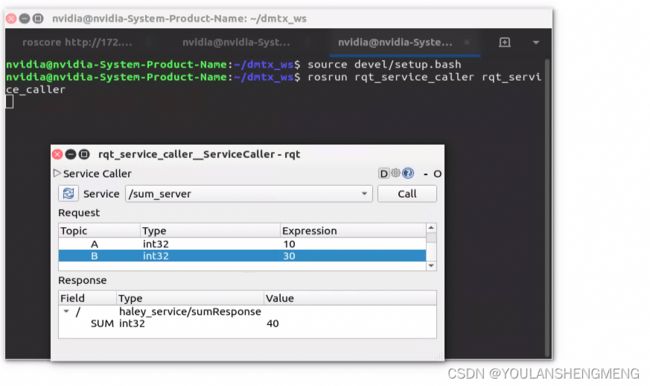
4. 使用c++写一个客户端测试服务
创建一个 client.cpp,内容如下:
#include
#include "ros/ros.h"
#include "haley_service/sum.h"
#include "iostream"
using namespace std;
int main(int argc, char **argv)
{
// ROS节点初始化
ros::init(argc, argv, "add_two_ints_client");
// 从终端命令行获取两个加数
if (argc != 3)
{
ROS_INFO("usage: add_two_ints_client X Y");
return 1;
}
// 创建节点句柄
ros::NodeHandle n;
// 创建一个client,请求add_two_int service,service消息类型是learning_communication::AddTwoInts
ros::ServiceClient client = n.serviceClient("sum_server");
// 创建learning_communication::AddTwoInts类型的service消息
haley_service::sum srv;
srv.request.A= atoll(argv[1]);
srv.request.B = atoll(argv[2]);
std::cout<<"!!!!!!!!!!!!!!!!!"< 在CMakeLists.txt的内容中添加如下的内容:
add_executable(haley_client_node src/client.cpp)
target_link_libraries(haley_client_node ${catkin_LIBRARIES})
运行打开三个终端
roscore
rosrun haley_service haley_service_node
rosrun haley_service haley_client_node 1314 521
